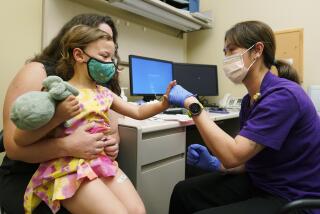Fresno Hospice for Ill Children Lets Families Take Much-Needed Breaks
- Share via
FRESNO — For more than a year, the days and nights of Robert and Janice Statham have been a round-the-clock blur of medicating and ministering to their desperately ill daughter.
Kimberly, a blond 2-year-old with pale blue eyes and a severe metabolic disorder, needs daily drugs--three doses of one, four of another, five of a third; milk feedings through a tube in her stomach every few hours, and constant comforting.
The Stathams never thought of taking a break--until the day Rotary House opened its doors and invited them in.
Billed as the nation’s first hospice for chronically ill children, the facility allows families to leave their kids for up to a week, to take a much-needed respite from the burnout of 24-hour care.
“You get to the point that you don’t even know who you are, where you are or whether it’s night or day,” Statham said.
Rotary House was created to combat that kind of physical, mental and emotional exhaustion, and to relieve some of the stress that can cause some families to break up and others to abuse their sick child.
“We hope to be preventive; that’s what we’re all about,” said Barbara Duffy, vice president of Valley Children’s Hospital, where Rotary House is located. “If they can have a week every so often, or a couple of days, and become refreshed, then that child gets better care at home.”
This is no hospital setting: The three-bedroom house is cheery and comfortable, with plants and clay animal figurines on the mantle and easy chairs in the living room.
Families can use Rotary House up to 30 times a year, leaving children for a minimum of eight hours and a maximum of seven days at a time. The cost is about $400 a day, which pays for two nurses at all times and other professional staff as needed. Payments are adjusted for families unable to afford that much.
“These parents desperately need a break,” said Dr. Joseph Bush, a psychiatrist at Virginia Commonwealth University who specializes in childrens’ adjustment to stressful medical procedures.
“The real benefit for the sick child will be that their parents are refreshed and will not resent them,” he said. “It’s pretty natural to--if not resent the child--then to resent the lack of free time.”
Rotary House has cared for between 30 and 40 children since opening three months ago, director Cindy Guertin said, and Kimberly Statham was the first.
Relinquishing Kimberly’s care to others was difficult for her parents, but once they were out the door, they realized it would be all right.
“I got two days of nine hours sleep -- and that’s the most I’ve had in over a year,” said Statham, who now is planning some weekend trips with his wife and four other children.
Caring for a chronically ill child at home can affect other family relationships. Sometimes the siblings of a chronically ill child develop behavioral problems to get attention.
“What we are finding is that this is not a luxury--it is an absolute necessity as part of raising a child with such profound disabilities,” said Dr. Mary Serreno, psychologist at Franciscan Children’s Hospital in Boston.
“It is absolutely unbelievable what the burden of caring for these kids is,” she said. “It is only this kind of respite that allows you to live.”
Foster mother Sue Allen agrees. She might not have taken on her latest charge, 14-month-old Scott, without the help of Rotary House. Allen, who has four children of her own, has cared for 27 foster children over the past 11 years, but Scott has the most medical problems.
Fourteen weeks premature, he weighed just two pounds at birth and suffers from fetal alcohol syndrome and chronic lung disease, which have sent him to the hospital 13 times since September.
“These kids come with feeding problems, medications, chronic lung disease, oxygen-dependent, suctioning and all that stuff,” Allen said. “You just can’t expect people to do that kind of thing, nor are they willing to.”
Social service agencies coordinating foster parent programs do not provide any respite care programs.
“It’s like, ‘Here they are--good luck! Do what you can.’ They’re just not set up to either fund (respite care) or provide it in any way,” Allen said.
It’s exhausting, which is why she needs Rotary House.
“It’s amazing what one day even once or twice a month can do for you,” Allen said. “You can just go at it with renewed spirit and feel invigorated and not feel so beaten down and exhausted mentally.”
More to Read
Sign up for Essential California
The most important California stories and recommendations in your inbox every morning.
You may occasionally receive promotional content from the Los Angeles Times.










